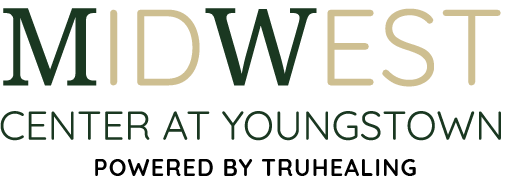 At Midwest Center at Youngstown, we believe that every person’s experience with substance abuse and circumstances are unique and that everyone deserves the opportunity to live a full life free from the ravages of addiction. Our substance abuse treatment programs can help our community heal.
At Midwest Center at Youngstown, we believe that every person’s experience with substance abuse and circumstances are unique and that everyone deserves the opportunity to live a full life free from the ravages of addiction. Our substance abuse treatment programs can help our community heal.
Our highly qualified master’s-level therapists are trained in substance abuse, mental health, and trauma and address substance use disorders with a trauma-informed lens. They are compassionate and understand your needs because they have helped hundreds of people just like you who suffer from drug and alcohol addiction.
Midwest Center at Youngstown’s evidence-based curricula, along with an individualized holistic approach, provides a solid foundation to best support you in every step of your addiction recovery journey. Reach out to our team at 844.544.0502 or connect with us online to learn more.
Our Addiction Treatment Services
Our programs and services include:
- Residential treatment in our 33-bed Austintown facility
- Withdrawal management (detox)
- Intensive outpatient programming
- Outpatient programming
- Medication-assisted treatment
- Individual counseling
- Group counseling
- Fitness and recovery
- Holistic wellness
- Case management
All services are provided in our treatment center except for case management which may be provided, as allowed, in the home or in the community based on patient preference.
Medicaid and most insurance is accepted. If you’re not sure if you need substance abuse treatment, contact our center today.
Addiction Treatment Programs
Residential Programming
Residential treatment includes a 24/7 stay in our Austintown facility and is highly recommended for intensive care. Inpatient treatment not only gives you the chance to step away and focus on your healing journey but also allows our staff to guide you through a personalized, in-depth treatment plan. Patients in this level of care also take part in individual and group therapy sessions, have access to medical services, nutritional counseling, wellness activities, and aftercare programs.
Withdrawal Management (Detox)
Outpatient withdrawal management (detox) involves treatment in our facility during the day and allows patients to return home each night.
Outpatient withdrawal management may be most suitable for people with relatively recent or less severe addictions, those with good support systems at home, and individuals with no other complicating medical or psychological issues.
Partial Hospitalization Programming (PHP)
PHP is a highly structured, intensive level of care consisting of daily group sessions which are currently held Monday through Friday from 9:00 am – 2:00 pm. Programming also consists of scheduled individual therapy services as well as family therapy and case management services when needed. Lunch and snacks are provided.
Those who attend partial hospitalization programs have often shown enough improvement to be well enough to leave treatment at night and stay healthy. Partial hospitalization is also sometimes used in cases where individuals have familial commitments, such as caring for children or elderly family members, that they can’t leave to partake in residential care.
Intensive Outpatient Programming (IOP)
IOP consists of group sessions three days per week which are currently held on Monday, Wednesday, and Friday from 9:00 am – 12:00 pm. Programming also consists of scheduled individual therapy, family therapy, and case management services when needed.
Patients participate in therapy to work on:
- Stopping substance use
- Adherence to a recovery plan
- Relapse prevention
- Mental health assessments
- Personal, social, family, professional, or educational dynamics
- Life skill building
Outpatient Programming (OP)
Midwest Center at Youngstown’s outpatient programming consists of one group session per week, which is currently held on Mondays from 3:00 pm – 4:30 pm. Programming also consists of scheduled individual therapy, family therapy, and case management services when needed.
Typically, those entering outpatient substance abuse treatment have already completed a residential program and/or received treatment through an intensive outpatient or partial hospitalization treatment program.
Therapies and Treatments
Medication-Assisted Treatment (MAT)
Medication-assisted treatment (MAT) combines behavioral therapy and medications to treat substance use addiction. Some individuals with opioid (and other) addictions can be prescribed FDA-approved medications, in combination with counseling and behavioral therapies, to provide a “whole-patient” approach in the treatment of substance use addiction.
Individual Counseling
Individual counseling involves one-on-one, face-to-face sessions with a counselor.
One-on-one sessions with a counselor enable you to work through issues that are often at the heart of your addiction. They also give you the opportunity to share sensitive or personal information that you don’t want to discuss in a group setting. Participating in individual therapy for addiction treatment also provides well-rounded support that helps facilitate long-term recovery.
Group Counseling
In group counseling sessions the group, led by the counselor, will explore alcohol and other drug problems and/or addiction and the ramifications of substance use. Discussions include an examination of attitudes and feelings and consideration of alternative solutions and decision-making.
Groups intrinsically have many rewarding benefits, such as reducing isolation and enabling group members to witness the recovery of others. Another reason groups work so well is that they are suited especially for treating problems that commonly accompany substance abuse such as depression, isolation, and shame.
Family Programming
Addiction is called “a family disease” for good reason. Family members are profoundly affected when a loved one becomes addicted to drugs or alcohol.
By the time most families reach out for help, the disease of addiction has typically progressed to a crisis level for the addict and the family. Our programs and services are designed to help not only people who have addiction but the entire family, including spouses, parents, siblings, and children.
Case Management
Case management services are offered throughout all levels of care. Case management includes a needs assessment and weekly (or more if determined necessary) meetings with a case manager.
Case managers can assist with basic needs (insurance, food, transportation, housing) to obtaining identification (DLS, ID) as well as connecting individuals with services to meet their specific needs.
Fitness and Recovery
In addiction recovery, your body, mind, and spirit all have major healing to do. And while you shouldn’t rush into any marathons, starting some kind of fitness routine can help keep your sobriety on track and promote healing both inside and out. Best of all, there are endless options no matter your athleticism or interests that all have amazing benefits.
Having a healthy outlet for relieving your stress isn’t just a good idea in addiction recovery; it’s crucial. Exercise is one of the healthiest, most rewarding forms of stress relief you can get. You’ll get a mood-lifting boost of endorphins that can almost immediately take the edge off.
Holistic Wellness
Holistic therapies focus on the individual’s overall well-being while also treating the physical symptoms of addiction and withdrawal.
Holistic therapy plans are flexible, catering to the needs of each individual, and feature personalized, non-medical methods of addiction recovery. Therapists treat physical and mental addiction symptoms as well as emotional and nutritional imbalances.
Aftercare
Our aftercare program typically consists of 12 sessions once a week over the course of a three-month period as well as individual sessions once a month to keep clients on track with their recovery needs. Our pre-approved curriculum relies on evidence-based practices and the MATRIX Model to assist clients in learning about their addiction, preventing relapse, and living healthy lives.
Contact Midwest Center at Youngstown Today
Learn more about the programs and services we offer in our addiction treatment center near Youngstown today.
